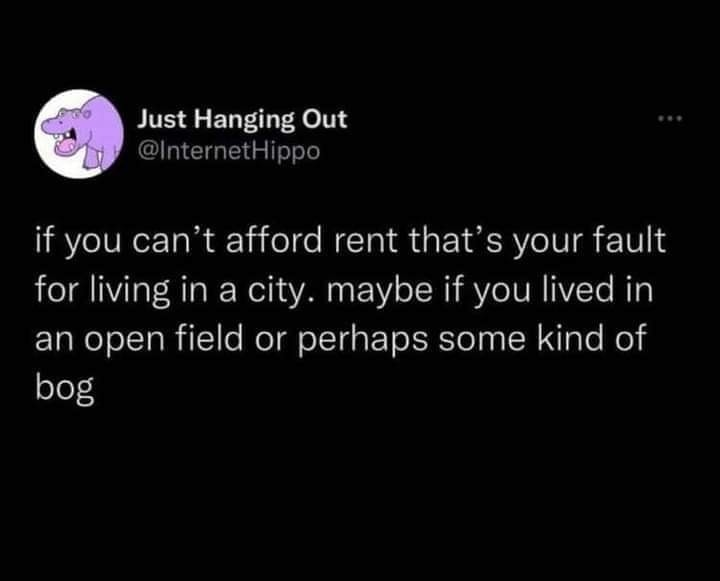this post was submitted on 22 Jan 2024
943 points (98.2% liked)
Political Memes
5445 readers
3314 users here now
Welcome to politcal memes!
These are our rules:
Be civil
Jokes are okay, but don’t intentionally harass or disturb any member of our community. Sexism, racism and bigotry are not allowed. Good faith argumentation only. No posts discouraging people to vote or shaming people for voting.
No misinformation
Don’t post any intentional misinformation. When asked by mods, provide sources for any claims you make.
Posts should be memes
Random pictures do not qualify as memes. Relevance to politics is required.
No bots, spam or self-promotion
Follow instance rules, ask for your bot to be allowed on this community.
founded 1 year ago
MODERATORS
you are viewing a single comment's thread
view the rest of the comments
view the rest of the comments

I’m not totally convinced that huge super-cities is the best way for society to move forward. Maybe we need more small towns and people living in the countryside.
What about dense, moderately sized cities with excellent city-planning? Well-developed intra-city and inter-city public transport? Cities are more efficient space-wise, but don't have to be depressing or expensive.
I think that the key word here is moderately sized. If I would guess, the optimum could be somewhere around 5’000 to 75’000 inhabitants. With those numbers you would probably not need any public transport within the city since you could bike or walk everywhere. At the same time you will be able to support some local shops for the most essential goods.
I think we should cull 95% of the human population and the problem will sort itself out.
Nobody said huge super-cities, any moderately sized metropolitan area would benefit from being a population hub.
I mean, with centralization going the way that it’s going we will end up there. If the cost of living in densely populated places is so high, I think it hints at an inefficiency with the arrangement. Maybe people should live in fields and bogs a bit more?
No, that hints at a supply and inequality problem. Cities tend to be more efficient because of economies of scale. Outside of large metropolitan areas, having access to a personal vehicle is downright a necessity for survival, which is the least efficient mode of transportation and forces extra costs on residents and the municipality.
As opposed to, say, a bus line that hits all the hotspots that everyone can use cheaply, requires less infrastructure, and reduces the per-capita environmental footprint.
Nobody is stopping you from being a bog body, but to pretend it is more efficient and preferential for the masses only serves to display your biases.
The municipality where I live made a study on green house gas emissions by where people lived. Curiously, the people living in the city center where those with the largest environmental footprint and those living more than 20 km away from the city caused the least emissions. They claimed that the difference was mainly due to lifestyle. People in the city tended to travel more by plane, ate food that had been prepared in restaurants rather than making it themselves, shopped more clothes and so on.
When there was a bus strike in the same city, air quality improved markedly. I suspect that those who take the bus in this particular city are those who would’ve otherwise biked (university students in Europe).
Living in a city comes with certain limitations to what you can do in your weekends. You can easily go out to consume and thus cause emissions. When living in the countryside, you can walk to the closest lake and fish your dinner without any emissions. Pretending that cities is the most environmentally friendly place to live is to ignore what people do except working, sleeping and traveling between the two.
So, again, this seems like an inequality issue, if only wealthier people can live in cities, cities will reflect the habits of the wealthy.
Biking is something you can largely only do in metropolitan areas, lord knows it's suicide to try and commute daily on the side of a road with no infrastructure for it.
Weird strawman, you know cities have parks, right? And cultural centers like museums that are often free for residents, local theaters, etc, none of which you would need to drive to.
Except the more people you have, the less infrastructure and emissions are required per person; there is a built-in efficiency. If you could click a link and read, instead of just assuming your preconceived feelings are true, you could have learned that "When the size of a city doubles, its material infrastructure—anything from the number of gas stations to the total length of its pipes, roads or electrical wires—does not. Instead these quantities rise more slowly than population size: a city of eight million typically needs 15 percent less of the same infrastructure than do two cities of four million each."
Cities are where people are, and its cheaper and more efficient to do things where people are, simple as.